HOW TO WORK TOGETHER? in documenta fifteen
The first two assemblies we organized in Palestine yielded a lot of material, testimonials, interventions, glossaries and other inputs from participants. After a deluge of questions and attempts at mapping the status quo, we attempted to consolidate these discursive efforts under one question, which is: “How to work together?”
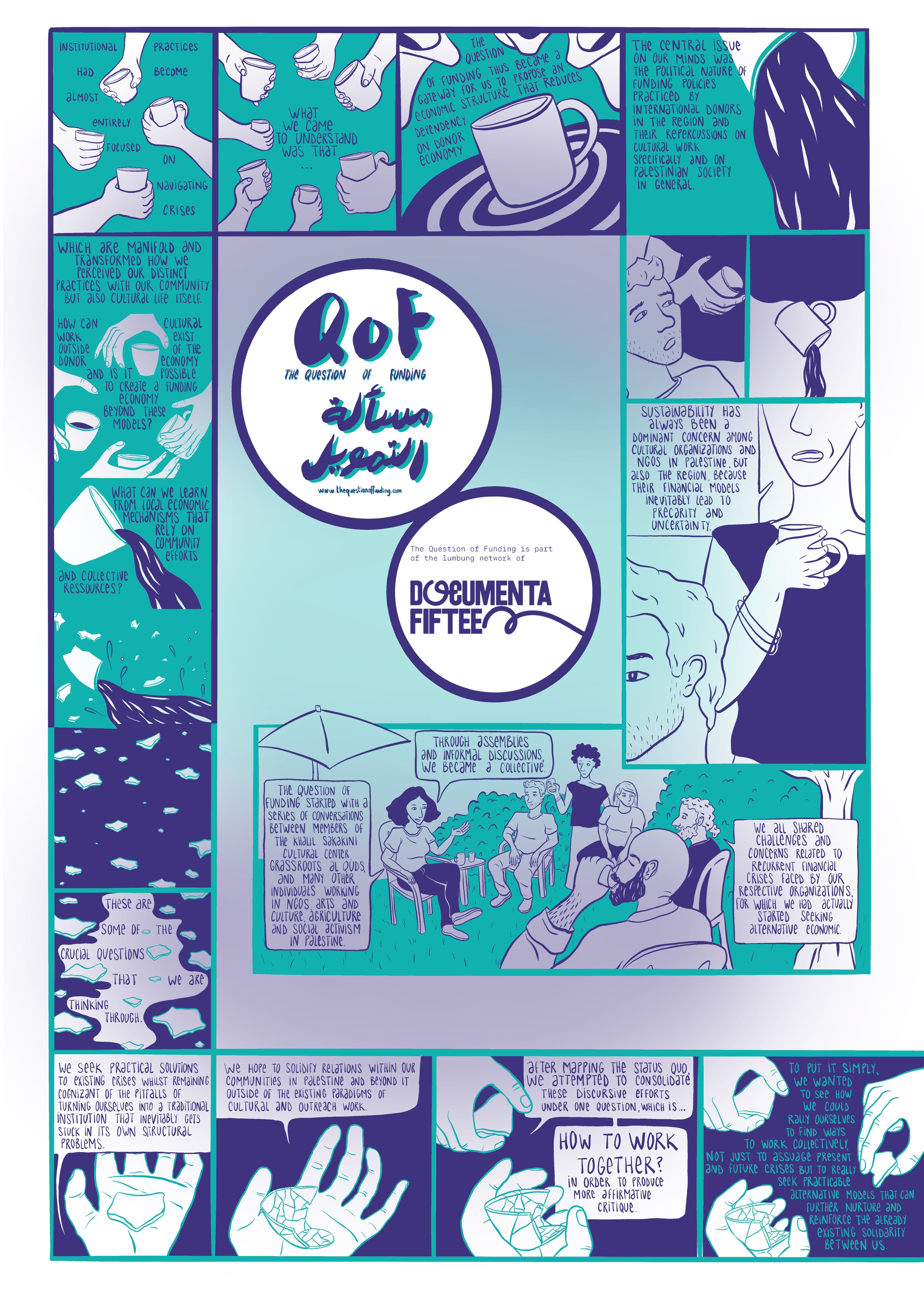
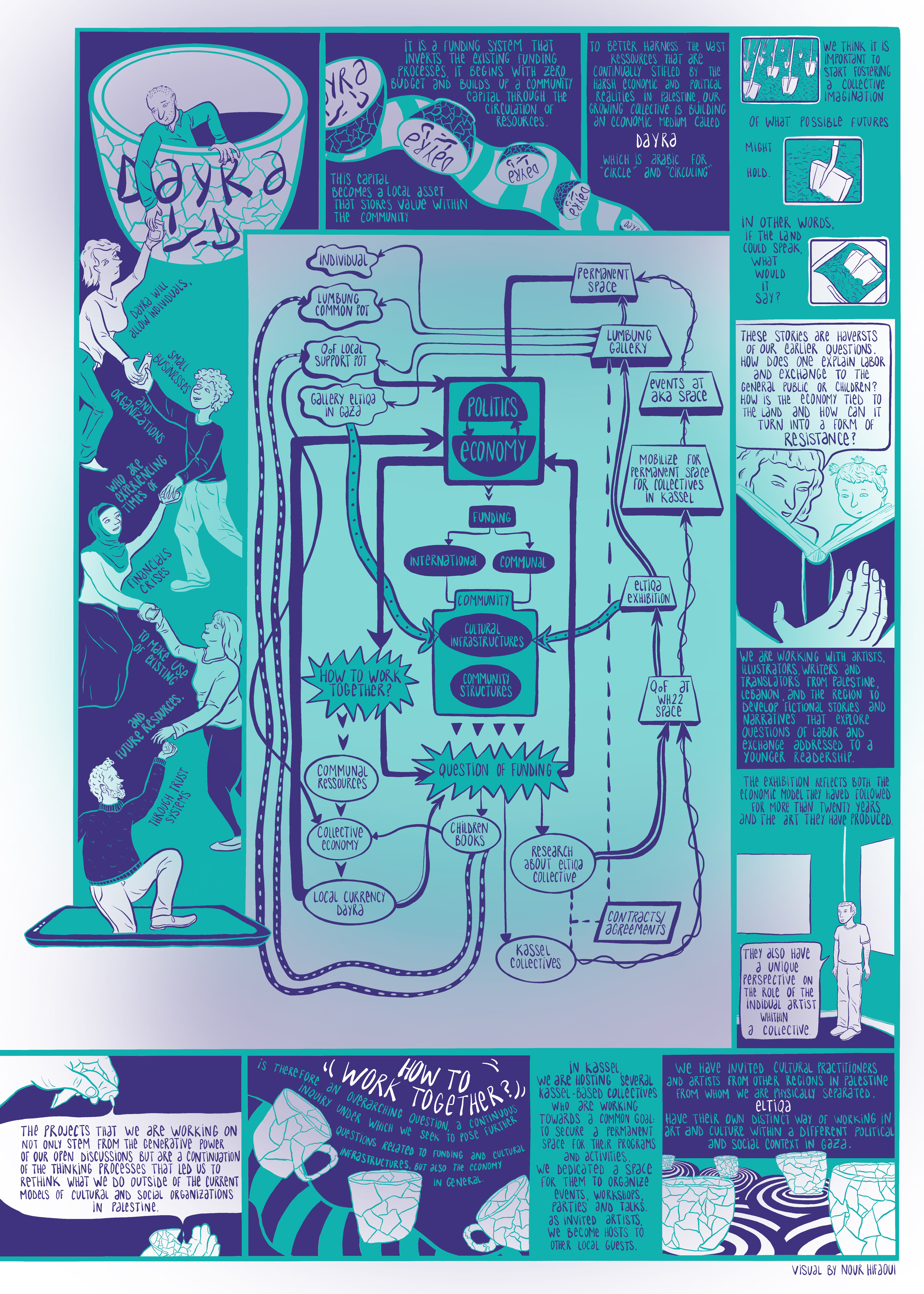
Poster by Nour Hifaoui
To put it simply, we wanted to find ways to work collectively, not just to assuage present and future crises but to really seek practicable models that can further nurture and reinforce the already existing solidarity between us.
The projects we work on in the framework of documenta fifteen not only stem from the generative power of these open discussions but are a continuation of the thinking processes that led us to rethink what we can do outside of the current restrictive models of cultural and social organizations in Palestine.
“How to work together?” is therefore an overarching question, a continuous inquiry under which we seek to pose further questions related to funding and cultural infrastructures, but also the economy in general.
Welcome to Aka
Under this working title, and in the framework of documenta 15 as our first “visible” endeavor, we continue with the same spirit of the encounters in Palestine by hosting several Kassel-based collectives and organizations, who named themselves Aka, who are working towards a common goal: to secure a permanent space for their programs and activities. We dedicated a space for them to organize events, workshops, parties, and talks. As invited artists, we become hosts to other local guests. Our connection with Aka extends the map of relations, almost like ripples in a pond that widen the circles of individuals and ideas.

Eltiqa exhibition and timeline
Eltiqa (Arabic for “meeting”) is an artist collective from Gaza city. For more than twenty years, they have developed artistic practices together and have extended their resources and knowledge to younger generations. What distinguishes Eltiqa as a collective is the flexible, creative, and responsive nature of their economic model, which helped the group to sustain itself through years of political, economic, and cultural struggles.
In collaboration with them, this exhibition includes a selection of their artworks and an annotated timeline of their activities. Through anecdotes by the collective and research by QoF, the timeline accentuates the different layers of their work and their practice’s correlation with political, social, economic, and personal stories. This is juxtaposed with the aesthetics of their artistic practice, which is produced in one of the most unstable environments in the world.
The works on display are for sale as part of the Lumbung gallery and will support Eltiqa artists, their space, and ecosystem, while also contributing to the Lumbung collective pot.
The harvest
Another key project at documenta fifteen that reflects more creatively the questions about the financial burdens of cultural work and the economy more generally will take the form of four books in which we explore issues related to labor, communal resources, and value through illustrated stories addressed to the youth.
We invited artists, illustrators, writers, and translators from Palestine, Lebanon, and the region to develop fictional stories and narratives that explore these questions. How does one explain labor and exchange to the general public or children? How is the economy tied to the land and how can it harness existing resources?
We call these stories harvests because they, in fact, harvest from our earlier questions to deploy others. There aren’t many books that try to talk about the economy in our context and we think it is important to foster a collective imagination of what possible futures might hold.
A Book Like No Other aims to expand children’s perceptions about the wonders of producing a book with communal resources.
![]()
Written by: Yazan Khalili
Edited by: Yousri Al Amir
Illustrated by: Sahar Abdallah
Translated to English by Mona Kareem
Translated to German by Larissa Bender
Arabic handwriting by Yazan Khalili
Design by studio safar
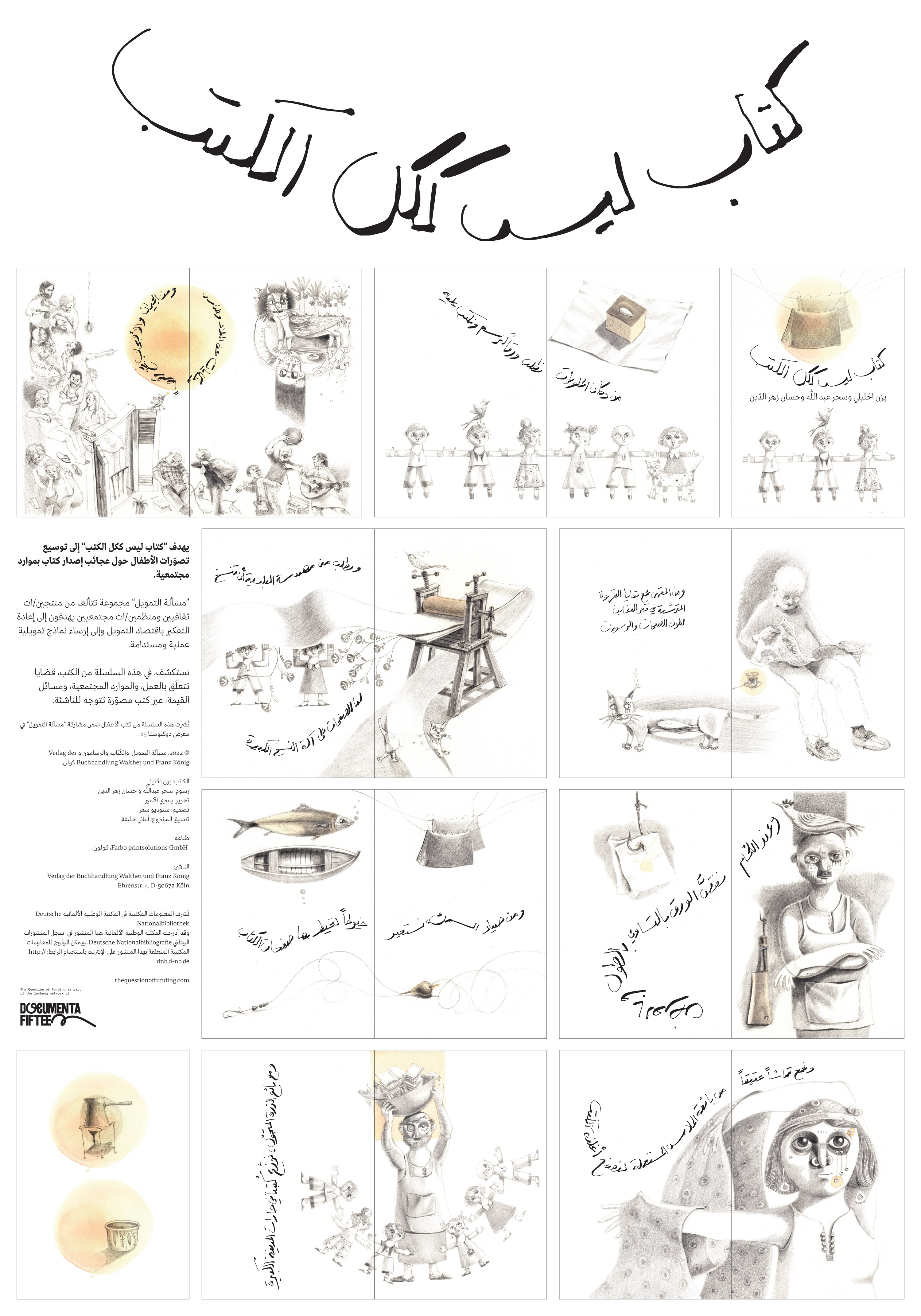
Written by: Yazan Khalili
Edited by: Yousri Al Amir
Illustrated by: Sahar Abdallah
Translated to English by Mona Kareem
Translated to German by Larissa Bender
Arabic handwriting by Yazan Khalili
Design by studio safar
Lina and the Working Hands: We use our hands daily, sometimes without us noticing them. Yet their lines bear the marks of time and labor. Lina, a defiant nine-year-old girl, decides to follow the journey of the working hands around her, from the market to the house and the fields.
![]()
Written by: Samir Skayni
Edited by: Yousri Al Amir
Illustrated by: Hatem Imam
Translated to English by Mona Kareem
Translated to German by Larissa Bender
Arabic handwriting by Yazan Khalili
Design by studio safar
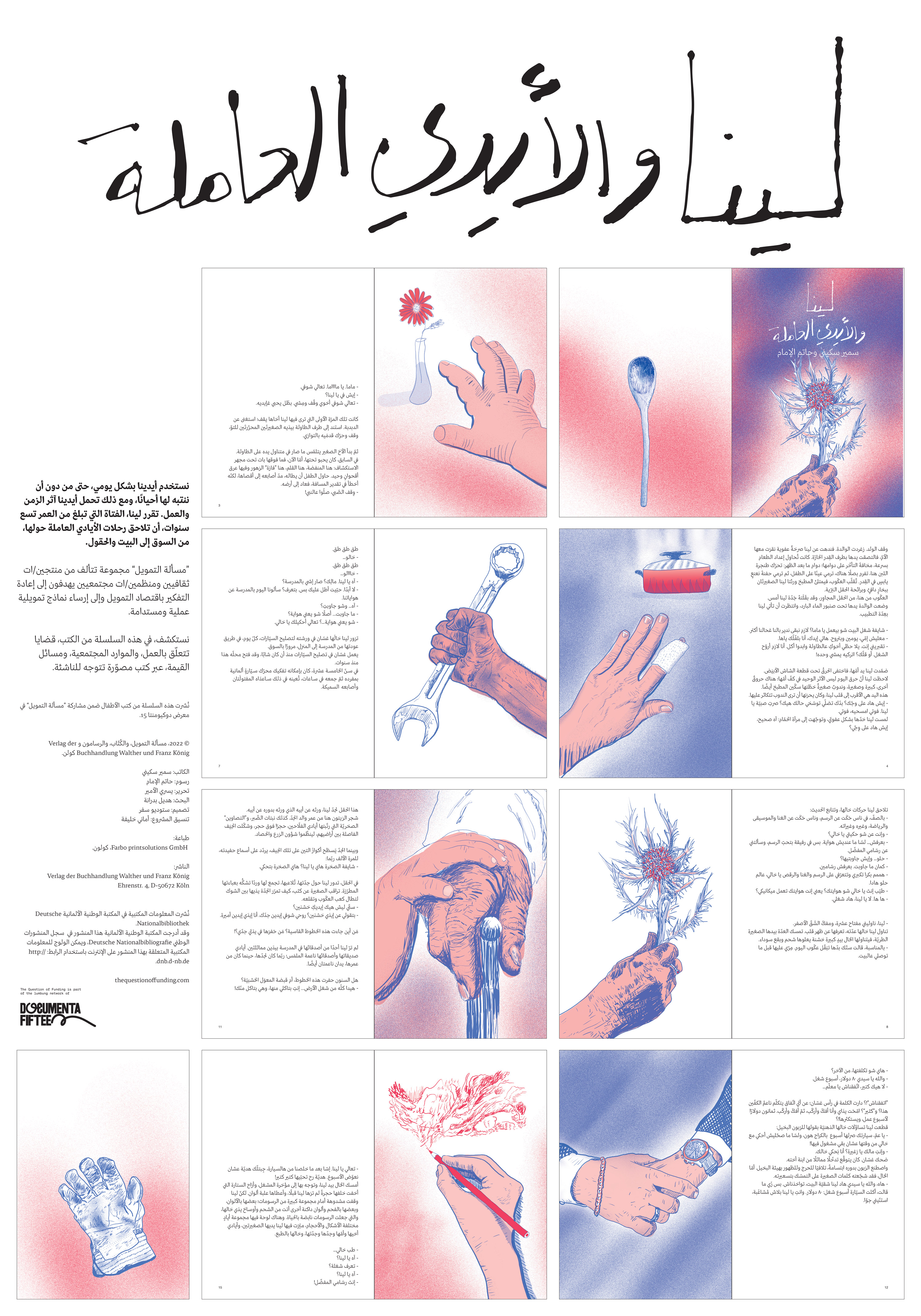
Written by: Samir Skayni
Edited by: Yousri Al Amir
Illustrated by: Hatem Imam
Translated to English by Mona Kareem
Translated to German by Larissa Bender
Arabic handwriting by Yazan Khalili
Design by studio safar
The Gentle Asphalt I Deserved is the journey of a shoe that travels between different owners and classes. The story explores how the shoe’s value changes from one geography to the next.
![]()
Written and edited by: Yousri Al Amir
Illustrated by: Hassan Zahredddine
Translated to English by Mona Kareem
Translated to German by Larissa Bender
Arabic handwriting by Yazan Khalili
Design by studio safar

Written and edited by: Yousri Al Amir
Illustrated by: Hassan Zahredddine
Translated to English by Mona Kareem
Translated to German by Larissa Bender
Arabic handwriting by Yazan Khalili
Design by studio safar
The Song of the Sea: The book is a story about fishing and the importance of inherited knowledge and local resources in economic production
![]()
Written by: Yazan Khalili
Edited by: Yousri Al Amir
Illustrated by: Sahar Abdallah
Translated to English by Mona Kareem
Translated to German by Larissa Bender
Arabic handwriting by Yazan Khalili
Design by studio safar
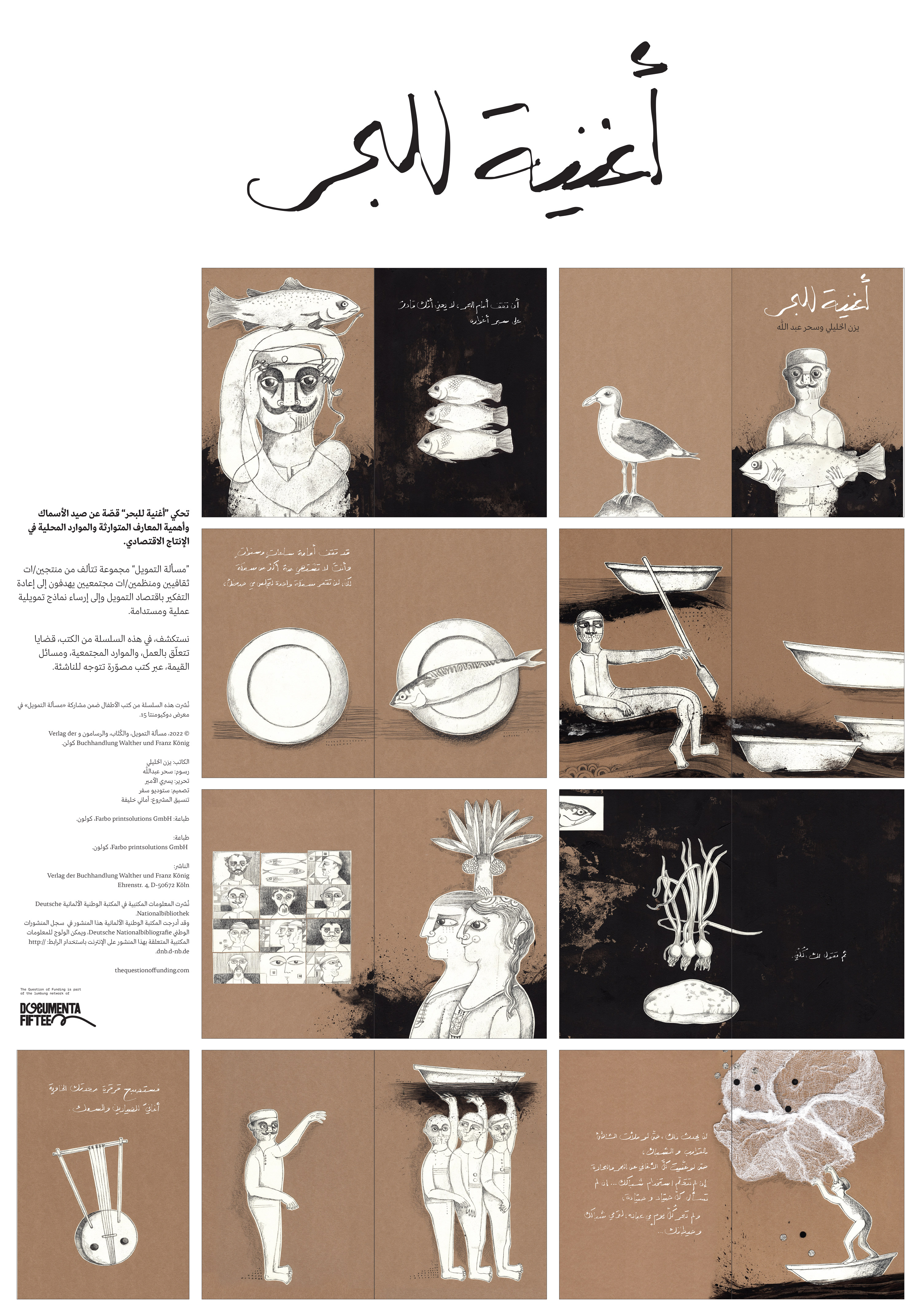
Written by: Yazan Khalili
Edited by: Yousri Al Amir
Illustrated by: Sahar Abdallah
Translated to English by Mona Kareem
Translated to German by Larissa Bender
Arabic handwriting by Yazan Khalili
Design by studio safar
Bibliography
Many of the reflections, frustrations, and critiques that contributed to the formation of The Question of Funding also exist in different forms and languages with several interlocutors. The bibliography below charts some of the thinking processes that helped shape the work of the collective today. It includes texts by and interviews with members of our collective but also texts by other authors and thinkers that encourage us to think more deeply about the topics that we engage. We hope this list grows with time and you are welcome to recommend to us texts, videos, interviews that you think we should look into:
READING CORNER
On institutional practices and navigating crises
Khaldi, Lara, Khalili, Yazan. “What we talk about when we talk about crisis: A conversation part I”. Interview by Marwa Arsanios. E-flux. 2020
Khaldi, Lara, Khalili, Yazan. “What we talk about when we talk about crisis: A conversation part II”. Interview by Marwa Arsanios. E-flux. 2022
On cultural institutions
Khalili, Yazan. “The Total Work of the Cultural Institution”. Interview by Rayya Badran. Makhzin. 2020.
Khalili, Yazan. “The Institution as Ideology”. A-desk. 2020
On institutional practices and navigating crises
Khaldi, Lara, Khalili, Yazan. “What we talk about when we talk about crisis: A conversation part I”. Interview by Marwa Arsanios. E-flux. 2020
Khaldi, Lara, Khalili, Yazan. “What we talk about when we talk about crisis: A conversation part II”. Interview by Marwa Arsanios. E-flux. 2022
On cultural institutions
Khalili, Yazan. “The Total Work of the Cultural Institution”. Interview by Rayya Badran. Makhzin. 2020.
Khalili, Yazan. “The Institution as Ideology”. A-desk. 2020
دعاء علي، شاكر جرّار. "المؤسسات المالية الدولية، والمديونية، والحرب: مقابلة مع علي القادري". حبر.2019
LISTENING CORNER
Khalefa, Amany. “The Question of Funding – with Amany Khalifa''. Interview. Conducted by Errant Podcast. March 24, 2022
Khalefa, Amany. “The Question of Funding – with Amany Khalifa''. Interview. Conducted by Errant Podcast. March 24, 2022
الخليلي، يزن و شرقاوي، فيروز. تحديات التمويل
وتأثيرها في الثقافة الفلسطينية مؤسسة الدراسات الفلسطينية
إيمان حموري. 2021
